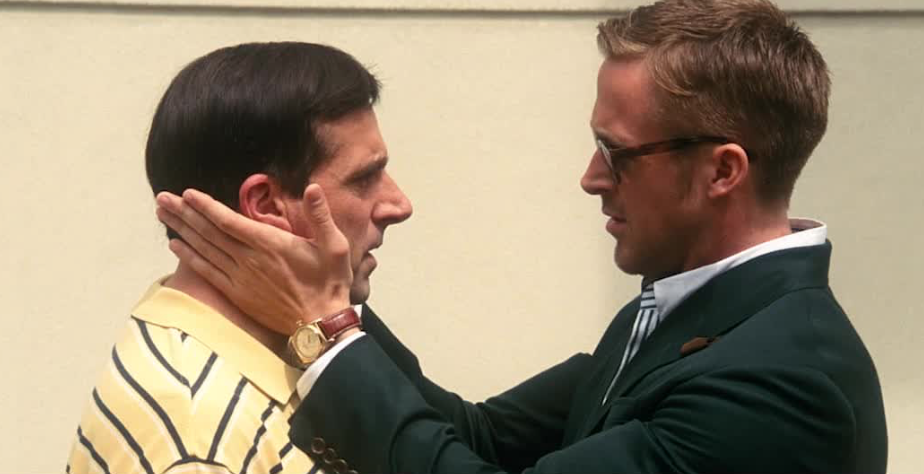MY MOM BELIEVED THE HIGHEST COMPLIMENT she could give when she saw me onstage or on film was to call me “professional.” Granted, she was British and not given to florid praise, but her definition of professional didn’t mean “competent.” It meant you were a worker. You knew your lines, you knew your marks, you showed up on time, you were respectful to your director, writer, cast, and crew, and you were tirelessly devoted to your craft. So when you performed in front of an audience, you made all that effort look effortless.
When I watch Ryan Gosling, that’s what I see: a professional.
He began his career in show business at age 12 as a dancer. Dancers have to rehearse laboriously in order to memorize the choreography and not hurt themselves or their partners, but in performance they have to let all the work go and feel the emotion flow through their body. Ryan Gosling inhabits his roles as if he were dancing, not acting. There’s a freedom and grace to him that I know comes from intense study and discipline, but I cannot see that work at all on screen.
“Crazy Stupid Love”
He is serious about his rehearsal process. Gosling studied piano three hours a day for three months in preparation to play a jazz pianist in La La Land (2016). He and Michelle Williams lived together in Pennsylvania on a tight household budget filming Blue Valentine (2010) so they could authentically play a young, struggling couple. During the filming of Drive (2011), Gosling took apart and then put back together the 1973 Chevy Malibu he drove in the movie. He got his broker’s license before filming The Big Short (2015). For The Believer (2001), Mormon-raised Gosling studied Hebrew and the Torah for months in order to play an Orthodox Jew who rejected his faith and became a Nazi. Yet despite this level of intensity, there are no stories about him of prima donna behavior during filming. He has his process but is never showy or demanding. None of his performances scream, “Look at me! Look at how hard I’m working! I’m IMPRESSIVE, aren’t I? Where’s my Oscar?” There is no fanfare, no drama, no attention-seeking, and no toxic on-set, “genius-at-work” behavior. He puts his head down, studies, collaborates, and does his job.
Nowhere is that more obvious than in his comedic roles, particularly The Nice Guys (2016). His “buddy-buddy” cop dynamic with Russell Crowe is easy and delightful. Their relaxed repartee is inspired, rivaling Robert De Niro and Charles Grodin’s in Midnight Run. They are two masters of their craft, collaborating generously and enjoying the hell out of each other, working off their opposing rhythms to perfection. Gosling is light and loose, and Crowe is muscular and heavy—a greyhound accidentally paired with a grizzly bear. Gosling plays self-destructive, alcoholic Holland March with breezy, nihilistic irony. He spends most of the movie hurting himself or getting hurt but miraculously not dying, his alcoholism literally and figuratively filling his body with liquid looseness that makes him virtually indestructible. Crowe’s Jackson Healy, even though he beats up people for a living, is more ethical, trudging through his violent assignments with heavy, grim determination. Their diametrically opposed physicality but similarly bleak outlook on life are what give The Nice Guys its congenial and gratifying flow. Together, they perform a kind of jazz-tinged funk, much like the music of Earth, Wind & Fire, which is featured prominently in the movie.
Ryan Gosling and Russell Crowe in “The Nice Guys”
Gosling even brings a sense of humor to his most intensely dramatic roles. In Blue Valentine’s early courtship scenes, Dean makes Cindy (Michelle Williams) dance while he accompanies her on his ukulele and sings “You Always Hurt the One You Love” in a goofy Elvis voice, showing the playful nature that originally attracted her to him. In Half Nelson (2006), a movie about a teacher ravaged by a self-destructive drug addiction, Gosling makes sure we see the devotion and respect he has for his inner-city students by the delicate way he teases and relates to them, joking around in class and gently mocking himself as their designated white authority figure. Even in a sentimental movie like The Notebook (2004)—at which, despite my best efforts, I did weep like a baby—Gosling imbues his character, Noah, with humor and pathos that in a lesser actor’s hands could cross the line into hokum. He and Rachel McAdams have such beautiful, high-spirited chemistry that they lift the movie far above treacly, tearjerker status and make it into something with earned emotional heft.
“Half Nelson”
It’s rare that an actor who is as good-looking as Ryan Gosling has such humility. Despite the effort he obviously puts into maintaining his Apollonian physique, there is no vanity to him. In Blue Valentine, he morphs from an optimistic, Brooklyn free spirit into a lost alcoholic with thinning hair and a slight paunch. In Lars and the Real Girl (2007), he taps into Lars’s trauma from his mother’s death and his father’s subsequent emotional abandonment, becoming a young man who despite being nice-looking, hardly speaks, is full of ticks, and who hides his body in layers of clothes so nobody, particularly non-rubber women, will touch him. In Half Nelson, he loses all the brawn he had in The Notebook to play a skinny, pale addict. He even makes fun of his physical perfection and heartthrob status in Crazy, Stupid, Love (2011), when Emma Stone’s character, on her quest to be seduced by “the hot guy that hit on me at the bar,” tells him to take off his shirt and he squirms as she ogles him: “Seriously?? It’s like you’re photoshopped!”
WHICH BRINGS US to Gosling as “Ken” in the mega-hit Barbie. For my money (sorry fellow feminists), Ken is the fount of humor in this cultural phenomenon. Through Gosling’s grace, charm, and comedic gifts, he manages to transform an almost two-dimensional character into the heartbeat of the movie. He is willing to be self-deprecating and use his physical perfection to play a doll whose sole concern is surface looks, and is plagued by insecurity when he doesn’t get the attention and adoration he thinks he deserves. He is a cautionary tale for dim, aggrieved men who believe they are owed respect by their mere existence. And he plays this entitled incel himbo to the hilt and wrings every drop of humor he can out of the part. In this female-dominated, explicitly feminist (some might say didactic, but that’s for another article) movie, he is happy to make himself the butt of the joke. And although he is game to play second-fiddle to Margot Robbie, America Ferrara, and of course, the director, Greta Gerwig, he has such verve and generosity of spirit that he ends up being the movie’s most memorable character.
“Barbie”
His compelling choice of projects, his willingness to invest himself fully, his lack of ego, his listening ability, his sense of humor, his work ethic, and his interest in, above all, serving the script dramaturgically (tip of the hat to Jeremy Strong), are what set Ryan Gosling apart from most of his fellow male actors. For thirty years, through intense discipline, he has focused on being an actor rather than being a movie star, which is why he can meld and disappear into whatever role he takes on. The range of his talent is extraordinary. And, like a true pro, he makes it all look so easy.





